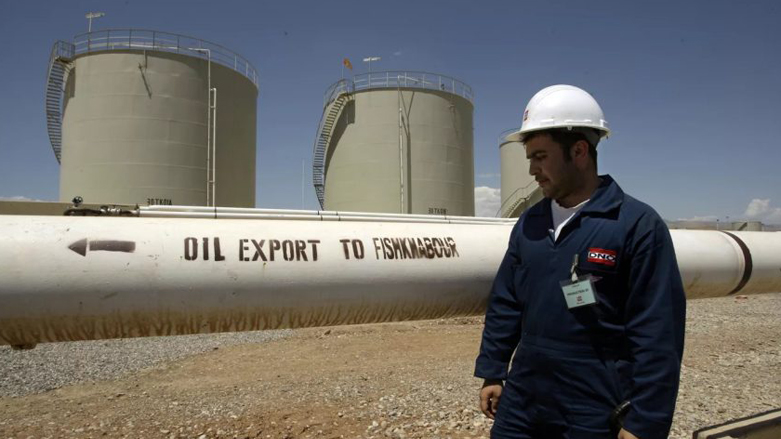Kurdistan oil firms urge cost recovery and profits via Baghdad-Erbil cooperation
“It is essential to the future of the industry in these regions, and the many jobs it supports, that the outcome of the negotiations include the cost recovery and profit to which the IOCs are entitled under existing Production Sharing Contracts (PSCs).”

ERBIL (Kurdistan 24) – The Association of the Petroleum Industry of Kurdistan (APIKUR) on Sunday called on Baghdad and Erbil to conclude negotiations to ensure that international oil companies’ (IOCs’) internationally recognized contractual rights are honored and incorporated into Iraq’s budget implementation and any future laws governing oil and gas in the Republic of Iraq and the Kurdistan Region.
Read More: Oil companies in Kurdistan call for resumption of oil exports
APIKUR was founded in 2023 by international upstream oil and gas companies active in the Kurdistan Region of Iraq with the goal of promoting the Region as an attractive destination for international oil and gas companies, service providers and investors.
“It is essential to the future of the industry in these regions, and the many jobs it supports, that the outcome of the negotiations include the cost recovery and profit to which the IOCs are entitled under existing Production Sharing Contracts (PSCs),” APIKUR said.
“The PSC model used in the Kurdistan Region has a competitive investment structure that is widely used in petroleum provinces around the world. Under the Kurdistan Region PSCs, the IOCs take all the financial risk and, in the case of success, the Kurdistan Region keeps the majority share of the reward.”
“The success of the PSC model for Kurdistan is clear,” the APIKUR statement underlined.
Therefore, it argued IOCs should be provided “with the confidence that their contractual right to recover costs and receive profit payments from successful projects, the Kurdistan PSC model is governed by English law with dispute resolution via international arbitration at the London Court of International Arbitration.”
APIKUR said due to the success of the Kurdish PSC model, the Kurdistan Region's oil sector has developed from almost nothing 15 years ago to currently produce around 250,000 barrels of oil per day.
“As Kurdistan’s most important industry by far, the oil and gas sector now provides tens of thousands of high quality jobs directly through the IOCs themselves as well as indirectly through service companies, contractors and in the communities neighboring our operations, homes and offices,” APIKUR said.
“However, this success has not come easily, with hundreds of millions of dollars spent by IOCs on exploration projects that proved to be non-commercial, all at no cost or risk to the Kurdistan Region,” APIKUR added.
“Federal Iraq’s new budget requires the Kurdistan Region to produce and handover to Federal Iraq, 400,000 barrels of oil per day. To achieve this, the Kurdistan Region will be reliant upon production from the IOC operated fields.”
Turkey halted the 450,000 barrels per day of Kurdish oil exports on March 25 at the request of Baghdad after the Paris-based International Court of Arbitration of the ICC ruled that Turkey had violated an aspect of the 1973 pipeline agreement between the two countries.
Read more: Iraqi parliament approves Article 13, among others, of Iraqi budget bill
In June, the Iraqi parliament accepted a budget law that obliges the KRG to export up to 400,000 barrels of oil per day through Iraq’s State Oil Marketing Organisation (SOMO).
If Turkey or any foreign nation chooses not to purchase this oil, SOMO can sell the oil to other entities or use it for its own domestic refineries, while compensating the KRG.
The Kurdistan Region has handed over 50,000-60,000 barrels of oil since mid-June as part of its agreements with Baghdad.
Moreover, a KRG delegation in Baghdad recently discussed Iraq’s budget and drafting of the federal oil and gas bill.
Read More: Oil companies in Kurdistan call for resumption of oil exports
The Association of the Petroleum Industry of Kurdistan in July also called for a speedy reopening of the Iraq-Turkey pipeline for oil exports four months after the closure of the pipeline in March.
“The oil industry in Kurdistan generated over 80% of the revenue for the Kurdistan Region’s economy in 2022. Should the pipeline outage continue, foreign investment will be further reduced, which in turn will put at risk further jobs and the ability for the industry to deliver the 400,000 barrels of oil per day required under the 2023-2025 Federal Budget Law,” the Association warned.
There is also a split among oil companies regarding the potential timeline for the resumption of oil exports. Up to now, discussions between Turkey and Iraq have yielded limited progress in the efforts to restart the exports.
Read More: Oil companies split on resumption of Kurdish oil exports
The US energy company HKN Energy Ltd. (HKN) on Aug. 7 said it “has little confidence that the ITP (Iraq-Turkey Pipeline) will open soon.”
However, the UK oil company Gulf Keystone Petroleum Limited in an update on Aug. 9 said it believes “the suspension of Kurdistan crude exports will be temporary and that the KRG will resume oil sales payments in due course.”